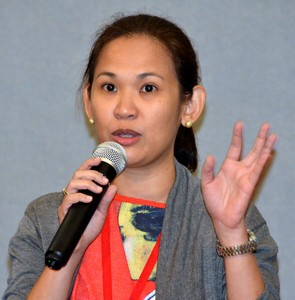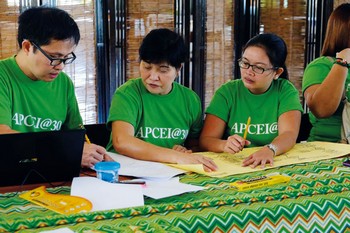The children of the first generation of entrepreneurs now manage the family business or work in them. They have inherited a lifestyle through which, at times, they discover their own vocation.
 by Florencia Locascio
by Florencia Locascio
from "Economia di Comunione - una cultura nuova" n.43 - Editorial insert of Città Nuova no. 7 - 2016 July 2016
Pinky Flores Mestica has been working in the Asia/Pacific Circulation Exponents, Inc. since 2004. It is a family business founded in 1986 importing and distributing national and international publications which was among the firsts to join the EoC. After her studies, Pinky enters as Head of Human Resources in the company, with the desire to make it more efficient and profitable. "I thought more formal and detailed procedures were necessary," she says. "However, it was not well received by the workers, especially the elderly. The impression I had was that I was less comprehensive or capable of compassion than my father Floro."
When her company, too, was affected by the financial crisis of 2008, Pinky understood  that in order to be a good leader like her father she is missing an important "ingredient". Watching Floro's behaviour she understands what it means to put the benefit of workers in the focus of the company. "My parents first gave up their benefits as company owners, risking personal property so that no one should lose their jobs. In those difficult times", remembers Pinky "we managers acted in a transparent manner, informing the workers of the actual situation, to help them make the best decisions for themselves and their families. Before making changes, we talked and listened to the workers. But not everyone shared the cost reduction measures necessary and a group has decided to promote a union action in the company."
that in order to be a good leader like her father she is missing an important "ingredient". Watching Floro's behaviour she understands what it means to put the benefit of workers in the focus of the company. "My parents first gave up their benefits as company owners, risking personal property so that no one should lose their jobs. In those difficult times", remembers Pinky "we managers acted in a transparent manner, informing the workers of the actual situation, to help them make the best decisions for themselves and their families. Before making changes, we talked and listened to the workers. But not everyone shared the cost reduction measures necessary and a group has decided to promote a union action in the company."
For Pinky this was a turning point: "I felt betrayed, but the humility with which my parents reacted to the situation made me understand where I had failed as a manager. So instead of treating employees with the detached attitude that I usually take when I'm upset,  I decided to "make myself one" with the group that wants to create the union inside the company, I followed the meetings in person, avoiding to delegate my assistant or lawyer. That way I had many opportunities for dialogue with the workers and I could enquire about their families. On the day of the vote on the formal constitution of the union, the majority of the workers did not consider it necessary any more. From 2013 the company's situation started improving and we are on the path of full recovery now. Now I have become Manager of Organizational Development and the experiences that I have lived with my family at the beginning of the crisis allow me to understand what it means to carry on a culture of giving that the EoC wants to spread in our company."
I decided to "make myself one" with the group that wants to create the union inside the company, I followed the meetings in person, avoiding to delegate my assistant or lawyer. That way I had many opportunities for dialogue with the workers and I could enquire about their families. On the day of the vote on the formal constitution of the union, the majority of the workers did not consider it necessary any more. From 2013 the company's situation started improving and we are on the path of full recovery now. Now I have become Manager of Organizational Development and the experiences that I have lived with my family at the beginning of the crisis allow me to understand what it means to carry on a culture of giving that the EoC wants to spread in our company."
Certainly the procedures to align with international standards are important and can be applied in the company, but Pinky has discovered the way to do it: through participation and dialogue.







